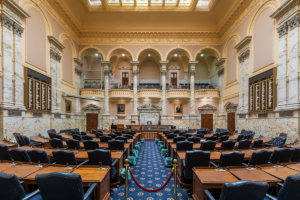Governments and nonprofits are increasingly being called upon to do more with less. An important part of this responsibility is the use of data-driven research and analysis. Since governments and nonprofits may be limited in the amount or type of research they can do – since their employees are often focused on data design and implementation – the Schaefer Center for Public Policy is ready to help gather and analyze the data needed for our increasingly data-driven world.
Policy Analysis
 The Schaefer Center’s extensive experience in policy analysis has helped governments and nonprofit organizations evaluate potential policy options, suggest methods of implementing potential or new programs or expanding current programs, and evaluate ongoing or ended programs. This work includes identifying best practices or lessons learned from policies and programs in other jurisdictions or other states in order to use limited public and nonprofit funds in the most efficient and effective manner possible.
The Schaefer Center’s extensive experience in policy analysis has helped governments and nonprofit organizations evaluate potential policy options, suggest methods of implementing potential or new programs or expanding current programs, and evaluate ongoing or ended programs. This work includes identifying best practices or lessons learned from policies and programs in other jurisdictions or other states in order to use limited public and nonprofit funds in the most efficient and effective manner possible.
Working directly with your staff, the Schaefer Center can identify the answers to the policy questions your organization needs to answer. The Center’s diverse staff experience in policy analysis can be combined with skills and knowledge from the University of Baltimore’s staff and faculty as well as subject matter experts from across Maryland. Together, we will suggest the best methodology or combination of methodologies – which may include use of our opinion research institute, which includes trained interviewers and focus group moderators – that will provide an impartial, nonpartisan answer to your policy analysis needs.
The Schaefer Center recently completed an operational review of Baltimore City Community College that resulted in changes in the college’ governing legislation. Other recent evaluations include several evaluations for the Maryland Department of Health including evaluations of the Tobacco Control Program and the Million Hearts Initiative and an evaluation of the Maryland Department of Aging’s Assistive Technology Program designed to improve the quality of life of individuals with disabilities by increasing access to assistive technology.
Program Evaluation
 The Schaefer Center has been working with state and local government agencies as well as nonprofit organizations in Maryland for 35 years to help evaluate the success of their programs. Our staff is uniquely qualified to conduct thorough, cost-efficient and rigorous program evaluations with experts in impact, process, and cost analysis. As needed, we also draw on the collective expertise of faculty from the University of Baltimore and the wider Maryland policy community. We regularly employ mixed methods of data collection – including our opinion research institute – and analysis to help agencies identify the outcomes and lessons learned from their projects.
The Schaefer Center has been working with state and local government agencies as well as nonprofit organizations in Maryland for 35 years to help evaluate the success of their programs. Our staff is uniquely qualified to conduct thorough, cost-efficient and rigorous program evaluations with experts in impact, process, and cost analysis. As needed, we also draw on the collective expertise of faculty from the University of Baltimore and the wider Maryland policy community. We regularly employ mixed methods of data collection – including our opinion research institute – and analysis to help agencies identify the outcomes and lessons learned from their projects.
Over the years, Schaefer Center researchers have conducted numerous evaluations of public and nonprofit programs in the areas of welfare, safety net programs, education, health care, and criminal justice, to name a few.
We are happy to start working with you on designing program evaluations even as you start designing your program, since grantors increasingly are looking for an evaluation component that can show the results of their investment. We have also stepped in closer to the end of projects, working with data you have collected during the program’s implementation and ongoing activities.
Recent evaluation projects include an operational review of Baltimore City Community College that resulted in changes in the college’ governing legislation. The Schaefer Center has conducted several evaluations for the Maryland Department of Health including evaluations of the Tobacco Control Program and the Million Hearts Initiative. The Maryland Department of Aging called upon the Schaefer Center to evaluate the Assistive Technology Program designed to improve the quality of life of individuals with disabilities by increasing access to assistive technology.
Policy Modeling
 Understanding how programs or services impact certain communities is an important component of policy making. This is true for both existing programs and service as well as proposed or new ones. Such modeling can also explore the demand for programs and services, which will provide estimates of the needed supply or the most efficient or effective pricing mechanism and amount. In many cases, policies and programs will have unintended consequences that such modeling can also help to uncover.
Understanding how programs or services impact certain communities is an important component of policy making. This is true for both existing programs and service as well as proposed or new ones. Such modeling can also explore the demand for programs and services, which will provide estimates of the needed supply or the most efficient or effective pricing mechanism and amount. In many cases, policies and programs will have unintended consequences that such modeling can also help to uncover.
The Schaefer Center provides quantitative modeling services to help local and state government agencies and nonprofit organizations evaluate their programs and services. This modeling can explore demand, supply, revenues, costs, and unintended impacts of new or existing policies. Its staff will work with your team to identify the assumptions that are necessary for building the model and to provide the types of impacts your organization needs for its decision-making. For its modeling projects, the Schaefer Center will work with your organization on the inputs and types of outputs the modeling should produce, while letting the model estimate the unbiased, non-predetermined impacts.
The Schaefer Center conducted an analysis of the impact of the benefits cliff on low-income Marylanders for United Way of Central Maryland. The results will be used to inform policy making to support Asset Limited Income Constrained (ALICE) families in Maryland.
Needs Assessment
 Nonprofit organizations and government agencies are often seeking to fill a missing “gap” in services or populations served. Identifying these gaps and ways to serve them is more important now as these entities are being called on to do more with less funding. These needs assessments can help organizations direct their services more efficiently and effectively. By providing specific services to those needing the most help, nonprofit organizations and government at all levels can have the most impact on their community.
Nonprofit organizations and government agencies are often seeking to fill a missing “gap” in services or populations served. Identifying these gaps and ways to serve them is more important now as these entities are being called on to do more with less funding. These needs assessments can help organizations direct their services more efficiently and effectively. By providing specific services to those needing the most help, nonprofit organizations and government at all levels can have the most impact on their community.
The Schaefer Center’s trained evaluation and policy analysis staff are available to help your organization understand and quantify the needs that your organization serves. We work with your organization to identify the best methodologies for such an assessment, which may include looking for best practices or lessons learned in other communities, analyzing your current service patterns or recipients or proposing how to begin collecting this data, and gathering the input of your service recipients or clients as well as potential recipients or clients. This work can help you meet grantors’ requests when you are seeking new or additional funding or show how your programs have helped fill the needs in your community.
Opinion Research

For over 30 years, the Schaefer Center has been supporting governments and nonprofits with high quality, timely survey research services. Through the Center’s extensive resources, it is able to conduct in-person interviews, and web-based surveys, as well as provide trained focus group moderators. In addition, the Center recently launched the new BeHeard Baltimore site, which has a goal to collect information on policies and activities important to residents of Baltimore’s 250+ neighborhoods. This project, which is being conducted in partnership with the Baltimore Sun, provides opportunities for Baltimore residents to share their opinions with policy makers about policy issues and events important to them and their community.
The Schaefer Center’s opinion research activities are designed to find the answers to the questions your organization is interested in. We’ll work with you to determine the best methods to capture the opinions of the population or a sample of the population in which you are interested. We will help you design, conduct, and analyze customized surveys adhering to strict data quality control. We can also help you explain the research methodology and results in ways that are easily understood for your various audiences.
Recent surveys include the survey of Baltimore City residents on the Aerial Investigation Research Pilot (surveillance plane) program, annual Maryland Department of Transportation Customer Satisfaction Survey, and the Maryland Business Climate Survey.
Data Analysis
 In this time of big data, nonprofit organizations and governments are collecting more information about their environments, their services, or their clients, among other things. However, since they are usually focused on service delivery, this data is often underused as a source for data-driven decision-making and more efficient and effective programs. Data visualizations are also not regularly used as a means of communicating complicated data for more general audiences.
In this time of big data, nonprofit organizations and governments are collecting more information about their environments, their services, or their clients, among other things. However, since they are usually focused on service delivery, this data is often underused as a source for data-driven decision-making and more efficient and effective programs. Data visualizations are also not regularly used as a means of communicating complicated data for more general audiences.
Schaefer Center staff are experienced in data analysis, ranging from simple demographic analyses of the general population, specific communities, and service recipients to complex multivariate statistical analyses. We can help your staff identify new ways to use and communicate data for both subject matter experts as well as the general public or suggest additional data collection and methods for the future. We can also collect the data, using surveys and focus groups led by our opinion research institute, that can help you tell your story. The Schaefer Center’s data analysis capabilities will help you provide information to decision-makers and address new and ongoing social issues. The Schaefer Center’s data analysis work also forms the basis of our policy analysis and program evaluation work.
